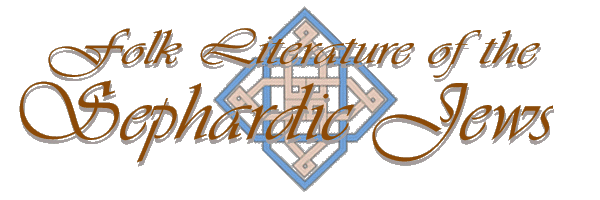Oral Literature of the Hispanic World
Samuel G. Armistead, Faculty Research Lecture, 1998, University of California, Davis
Dedication and Acknowledgments
The Nature of the Pan-Hispanic Ballad
The 700-Year Oral Tradition of the Pan-Hispanic Ballad: A Case Study
Enter Judeo-Spanish: A Living Matrix of Pan-Hispanic Ballad Traditions
Medieval Epic and the Ballad: An Example
The Invention of Tradition: A Case of "False Memory"
Creative Cultural Fusions: "Orientalizing" the Ballad Melody
Dedication and Acknowledgments
I would like to dedicate this lecture to the memory of my friend and colleague, Joseph H. Silverman, who, for over 30 years, worked with me on the project which is central to what we will talk about tonight.
Acknowledgments
It is a great pleasure, a privilege, an honor, a source of much personal satisfaction, to be here with all of you this evening. First of all, I must insist: I have not done this work alone. Many people have helped to keep our research project alive and, if you will bear with me, for just a few moments, I believe that the present context is an appropriate one in which to express my heartfelt gratitude.
Before I say anything more, I want to thank Chancellor Larry N. Vanderhoef and Provost Robert D. Grey, and Prof. Bryan Miller and the members of the committee who honored me and my research by electing me to be Faculty Research Lecturer for 1997-1998. I consider this award to be a marvelous vote of confidence, a powerful incentive to carry forward my projects, to continue my work with renewed energy, to strive for ever more fruitful and interesting discoveries and achievements. I am incalculably grateful.
None of this would have been possible, had it not been for many, many friends and colleagues, who, over the years, have intervened, in numerous different ways, to help, to contribute to this project, to keep it going forward, to lend their invaluable support. I cannot possibly mention here all the people who have helped us, but some I simply must mention, if only briefly: First of all, of course, I must acknowledge my two co-workers and dear friends, who have been with the Judeo-Spanish project since its very inception, over 40 years ago: These are, as I mentioned, my late colleague and friend, Joseph H. Silverman, of U. C. Santa Cruz, and my friend, Israel J. Katz (Joe Katz), whose unrivaled expertise in ethnomusicology and whose unlimited love of knowledge continue to be indispensable components of our ongoing work.
It is a great pleasure also gratefully to acknowledge the crucial support of two chairs of the Spanish Dept., first Robert M. Scari and now Robert Blake, who, since my arrival here at U. C. Davis, in 1982, and down to the present day, have created and maintained optimum, ideal conditions, under which our work could be carried forward. I must also include here other crucially important contributors: Needless to say, Karen L. Olson, who as technical editor of our ongoing series of volumes, has made and is making an absolutely indispensable contribution; without her help, none of this work would be at all possible. I must also thank Carolyn Jamison, MSO of the Spanish Dept., who has been unfailingly and enthusiastically supportive and who has flawlessly administered our several grants from the NEH. I wish also to thank the outstanding staff of Spanish & Classics and our associated Departments. One could not wish for a better and more helpful team.I must thank as well Nancy Loeb, whose expert professional advice has been indispensable in the ongoing and, for the Humanities especially, the ever more challenging process of successful grantsmanship.
I must also thank Steve Kidner, of the Office of Instructional Media, for his expert technical help and his continued personal interest in what I have set out to do. And I wish now to acknowledge also Dr. Bruce Rosenstock, with whom I am now planning the complex process of transferring all of our many hundreds of field tapes to a digital bank, where they will be safe, in permanent form, for the benefit of future generations.
Last, but by no means least, I must gratefully acknowledge the generous support of a series of Deans of Letters and Sciences: Allen G. Marr, Leon Mayhew, D. Kern Holoman, and JoAnn Cannon, and Vice Provosts for Research: Barbara D. Webster, Robert N. Shelton, and Kevin Smith, who have enthusiastically supported my work over the years. And in an extramural context, it is a pleasure to acknowledge also the generous support of the National Endowment for the Humanities, which--despite the very best efforts of Newt Gingrich--has continued to support our project, with one brief hiatus, from 1981 to the present, and the Lucius N. Littauer Foundation, which has supplemented that crucial support with a series of generous grants. And in the present context, too, my thanks also go to Cindy Alexander, of Ceremonies and Special Events, for her stellar work on planning and organizing this this event.

 Software development and hosting is currently provided by the
Software development and hosting is currently provided by the